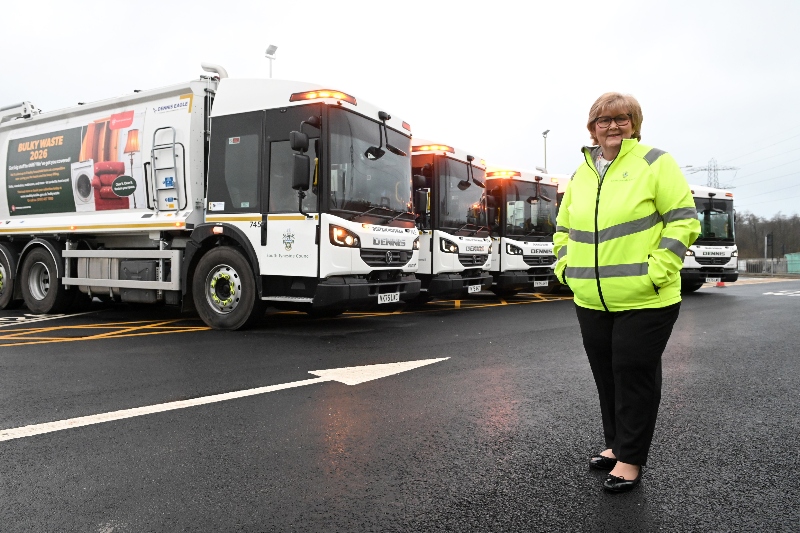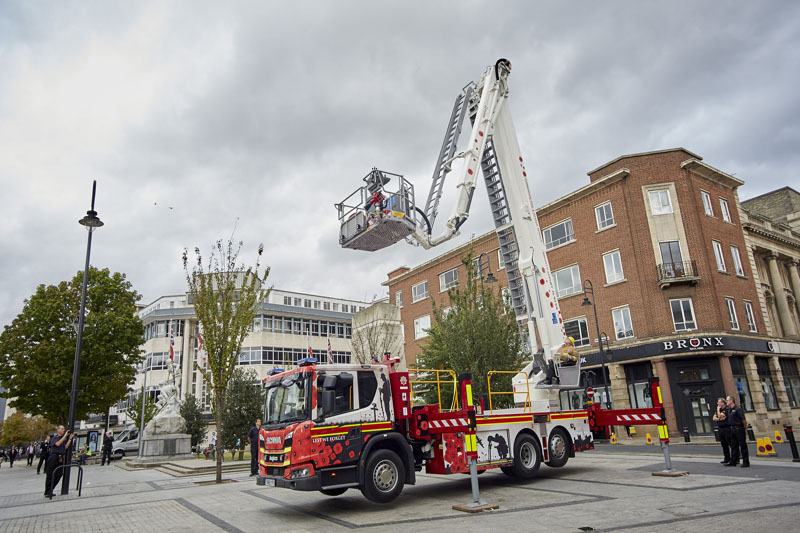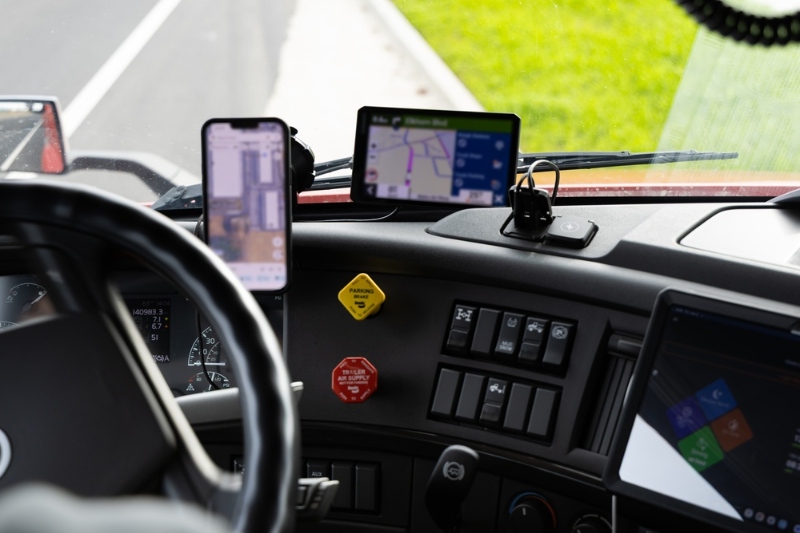Biffa's campaign to stop dangerous driving on pavements won the Best Fleet/Road Safety Initiative at the 2018 Future Fleet Awards. Biffa municipal health and safety coach Dave West tells LAPV how the scheme has evolved and is now moving beyond the waste sector. Lotte Debell reports.
When Biffa said 'enough is enough' and started to tackle the problem of drivers short-cutting on pavements to get around waste collection vehicles, little did the company realise that its pilot scheme would turn into a multi-award-winning, sector-wide campaign with the support of 22 police forces across the UK and backed by councils, competitors, and trade unions.
Drivers shouldn't need to be told not to drive on pavements, but according to figures from the Department of Transport, there are around 2,500 accidents involving vehicles and pedestrians on pavements every year.
This problem is particularly acute for waste collection crews. When frustrated drivers stuck behind waste collection vehicles take to the pavements to continue their journey, they put bin crews and pedestrians at risk. And it happens far more frequently that you might think ' up to 1,000 times a day, according to Biffa's research. No wonder around 10% of vehicle-pedestrian incidents occur on pavements.
The DRoPS (Driving Recklessly on Pavements) safety programme began life in the Isle of Wight in 2010 when Biffa put cameras on its RCVs and realised the scale of the problem for the first time. The company's contract managers started using the CCTV footage to help identify drivers who were mounting the pavement, and the initiative grew from there.
For Dave West, regional municipal health and safety coach, DRoPS has become something of a personal mission, and it's not just about the physical safety of staff or pedestrians but the impact on staff wellbeing. 'Our staff are abused physically and verbally when they do their jobs and it affects them, even if they won't admit it. Some of our people still think this is just part of the job, and it's not. It's not right. This campaign is all part of getting staff engaged with the job and demonstrating that we value their wellbeing'
In 2015, Biffa set up its first pilot project in Staffordshire. With the help of local MP Gavin Williamson, now Defence Secretary, and South Staffordshire Council, Biffa secured the backing of Staffordshire Constabulary and worked with the police to develop a simple reporting structure that would enable the company to quickly and easily report the most serious incidents and allow police to respond without adding significantly to their workload.
'In Staffordshire, if someone drives on the pavement, we upload a video to a police portal, fill in a form and email it to their traffic department. The police then watch the video and determine whether the incident was dangerous. If so, they send a letter to the driver who is either sent on driver training or gets points on their licence, depending on the severity of the incident'
Securing the backing of the local council and police force was only one element of the DRoPS campaign, however. Biffa also needed to change the attitude of its bin crews from 'it's just part of the job' to a willingness to report incidents knowing they are backed up by the company's senior managers. Finally, it focused on raising awareness with the public to try to prevent incidents. Clear signage on vehicles and crews' high-vis clothing was part of this. 'People see the speed camera logo on our crews' high-vis and it makes them stop and think,' says Dave.
Staffordshire may have been the first police force to come on board in 2016, but it is now one of 22 police forces in England, Scotland, and Wales supporting the scheme. Gavin Williamson also arranged for Biffa to meet with UK Roads Policing, a meeting that Dave describes as 'hugely significant' for helping Biffa bring other constabularies on board. It was for this meeting that Biffa put together a video using camera footage from its vehicles to underscore just how much of a risk this behaviour presents to both its crews and other pedestrians. Some of the incidents in the video are genuinely shocking ' it can be viewed online at www.biffa.co.uk ' and Dave says it was instrumental in gaining police backing.
Of the 22 police forces supporting DRoPS, 17 have an agreed reporting process in place, many of them replicating the process and procedures developed with Staffordshire. Another nine have agreed to back DRoPS and are in the process of setting up reporting procedures. Biffa is in discussion with a further five. The scheme also has the backing of 22 councils where Biffa has contracts, and the unions GMB, Unison and URTU. It is even backed by competitors including Veolia, FCC, Serco, Suez, and Kier.
'We are sharing this scheme with any waste company or local authority that wants to use it, because we feel it is too important to keep to ourselves,' says Dave. 'For example, I recently helped Birmingham City Council negotiate a trial with West Midlands Police. We can provide all our documentation to anyone interested in implementing DRoPS and help with setting up the scheme. The more people involved, the stronger the message, and that's why we are also looking beyond the waste sector'
From 2011 to 2015, there were at least 2,500 accidents on verges and footpaths every year, according to Department for Transport data. 'If we want to make a dent in these figures,' argues Dave, 'we need to do something nationally'
And so DRoPS has evolved again. Recognising that similar safety issues affect highway workers, Biffa is linking up with Highways Traffic Management Association, using its experience of DRoPS to help the HTMA speeds up its response to its own safety issues. Highways maintenance contractors are currently looking at Biffa's strategy for DRoPs to help them with their problem with roadworks vehicle incursions, and Biffa is also targeting training providers of driver CPC programmes to include DRoPs in their schedules.
DRoPS has also been presented to Road Safety Great Britain, the Health & Safety Executive ' the scheme has been included in the HSE's new Help Great Britain Work Well strategy ' the Local Authority Waste Industry Safety and Health Group, the Local Authority Recycling Advisory Committee, Liverpool Road Safety, and the Chartered Institute of Waste Management. After presenting at the international IOSH (Institution of Occupational Health and Safety) conference, Dave West met the head of road safety at RoSPA, and will attend the national road safety meeting in October. And so the awareness campaign continues to gather momentum.
The most recent strand to the campaign is not aimed so much at changing behaviour as at stopping bad behaviours before they develop. Young driver/passenger casualties account for 25% of all UK road fatalities, and it is all too easy for young drivers to pick up bad habits. Good Egg Drivers provides training and advice for young learner drivers before they take their driving test, and Biffa has linked with the organisation to include DRoPS content in its Good Egg New Driver Guide. This aims to positively influence the behaviour of learner drivers to drive considerately near waste collection crews, and Dave borrowed a phrase from New York's successful campaign 'go slow to go around' to drive this message home.
The link-up ensures the DRoPS message appears in six pilot DVSA driving theory and practical test centres until the end of September 2018, with the subsequent potential of being delivered to all theory/practical test centres nationally. The DRoPs message is also featured on Good Egg's national digital platform, which is accessible by schools and colleges via links provided to almost 400 local authorities across the UK.
But Dave hasn't stopped there. He is now targeting the Highway Code, seeking a change to the current wording to spell out the need to slow down around service vehicles and road workers. Thanks to Good Egg, he is looking to meet with a senior executive of Road Safety Great Britain to discuss this possibility.
The reason DRoPS is gaining such attention and support is not just because it is a highlighting a serious safety issue, but because it is working. After a year of the campaign in Staffordshire, a third of the 300 incidents reported by Biffa resulted in police action or prosecution. Weekly incident reporting also fell by half to just 12. At nearby Cannock Chase, police prosecuted more than 200 of the 600 incidents reported by Biffa in a year.
But the results of DRoPS have been felt beyond simply an increase in prosecutions. The key to solving the problem is changing behaviour, and simply making people aware of just how dangerous their actions are can sometimes be surprisingly effective. 'Most of the people doing this are not criminals, they are just so focused on where they need to be that they don't realise the dangers,' says Dave. 'We have actually had people call the depot after they have been contacted by the police to apologise to our staff once they realise what they have done. This kind of awareness will help to reduce future incidents'
As a result DRoPS is winning awards, most recently from ROSPA. But the first ' and for Dave the most meaningful ' was the Future Fleet Best Fleet/Road Safety Initiative in January this year. 'It was an acknowledgement from the industry and that meant a lot to us because this issue has been ignored for so long. And what made it even more special was the calibre of the judging panel. To get this award from those judges was very special'






